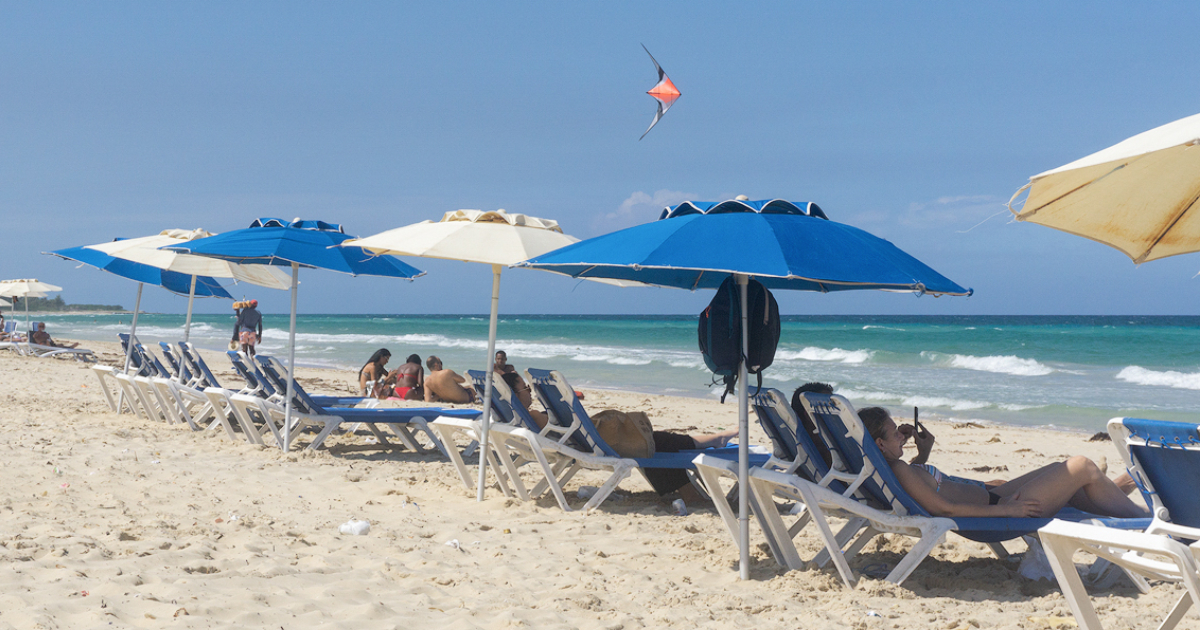
A new case of discrimination was reported by a family that this Sunday decided to go spend the day on the beaches in the east of Havana, and when trying to rent an umbrella, they were told that they were only for foreigners.
The independent agencyCubaNet tells what happened to some parents with their children when they wanted to rent utensils to protect themselves from the sun on the Mar Azul beach, located in Santa María del Mar, in front of the MarAzul hotel, owned by the Cubanacán company.
"When I arrived with my husband and two children, we approached those who rent the umbrellas and asked the price. They did not answer us. My husband insisted and explained that we had money and wanted to pay for the service. The workers, who were also drinking alcohol, they continued to ignore us," said the 35-year-old woman.
"They only attended to us when my partner told them: If we were foreigners, they would already be running to put the chairs for us, right? To which they immediately responded: of course," he said.
"Minutes after telling us no, we saw them run to provide service to a foreign couple, while my children are under a bush. In this country, they don't even treat you like a person with money," she stressed indignantly.
This family was in Mar Azul last Tuesday and without any problem rented two chairs and an umbrella for 2,000 pesos.
According to another user, during the week there is a rental service for Cubans, but on Saturdays and Sundays, as there is more demand, only for tourists.
"They had empty spaces but they wouldn't rent them to you unless you were a foreigner or Cuban living abroad and could pay with currency," he said.
When she and her partner returned home in the afternoon, the seats were still free. "There were very few foreigners," he said.
This same week, a Cuban couple who had intended to spend their honeymoon in a hotel in Cayo Coco, saw their dream frustrated when they were told that it can only be booked from abroad.
The young woman went to the reservations bureaus located on the central street of 23 e/L and M in Vedado, on the ground floor of the Habana Libre Hotel, and there they informed her thatThere were no reservations for Cuban residents, and they are only available abroad.
"Discriminatory policies are unfair and immensely harmful. I invite anyone who wants to verify what I say," Johanna Jolá Álvarez, mother-in-law of the young woman who is going to get married, said on Facebook.
About two weeks ago, the administration of theHotel Angsana Cayo Santa María apologized for a letter that was circulated on social networks with the facility's letterhead, which informed its workers that Cubans would not be able to stay at the center, after denying that same information in previous days.
In a new communication signed by the hotel's Sales and Marketing Director, they "clarified" the fact and stated that it was an editorial error, when they had recently denied everything in an official note from the Gaviota hotel group.
"The information was not properly written and lent itself to erroneous interpretations about said measure," the new letter stated.
The institution apologized for the "confusion" and noted that national tourists could book at its hotel "as long as thebookings are carried out through business partners and not through illegal shopping sites.
According to the document leaked days before, theHotel employees had to "carefully check nationality" of their clients and if there was a Cuban in the reservation, they would have to "deny their entry to the hotel and cancel their reservation immediately, at no additional cost. This measure is not negotiable."
Last April, an official from the Ministry of Foreign Affairs assured Americans visiting the Island thatIn Cuba, unlike the United States, the hotels are owned by the people.
Johana Tablada, deputy director general of the United States Directorate of the organization, told more than 150 leaders of social movements and organizations in that country that the money spent by foreigners in the country goes to public services.
"It is totally opposite to what the United States says, that the money goes to the army and all that shit that they talk about all the time. In the case of Cuba, the owner of the hotels is the Cuban people, the money that you spent on the hotel goes to public services, to health, to education," he stated.
What do you think?
SEE COMMENTS (2)Filed in: